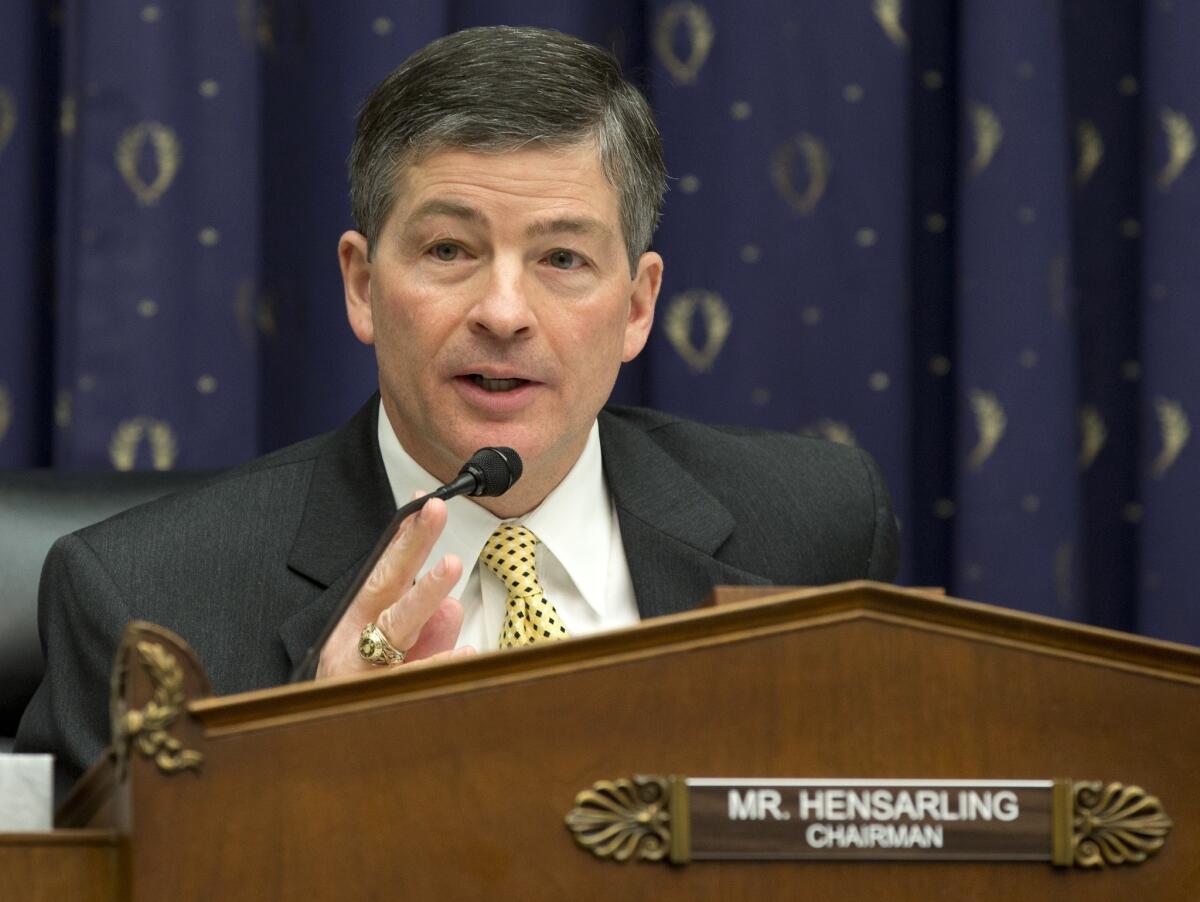Republicans intensify pressure to limit powers of consumer agency

- Share via
WASHINGTON — Republicans have stepped up their pressure to limit the wide-ranging powers of the nation’s watchdog over consumers’ money matters.
The head of a key House committee overseeing the Consumer Financial Protection Bureau said he would no longer accept the testimony of Richard Cordray, the bureau’s director, before his panel because he doesn’t believe Cordray was legally appointed to his post.
Cordray, who delivered his semi-annual report to the Senate Banking Committee on Tuesday, was set to do the same in coming weeks in the House, as required by law.
But Rep. Jeb Hensarling (R-Texas), chair of the House Financial Services Committee and a leading critic of the bureau, contended that President Obama’s recess appointment of Cordray last year was unlawful because the Congress, technically, was not in recess.
The bureau has been under attack by congressional Republicans and other opponents since it was created in 2010, over the GOP’s strenuous objections, as the centerpiece of the Dodd-Frank overhaul of financial regulations.
Republicans have tried since to rein in the bureau’s authority, arguing that the bureau was too powerful and posed a threat to the health of banks and the rights of consumers. Nearly all Senate Republicans have blocked the confirmation of any nominee to the post until the administration agrees to curtail the bureau’s authority.
“No other regulator has more influence over the daily financial lives of Americans,” Hensarling said. “How is it fair to American consumers that one unelected, unaccountable bureaucrat in Washington has the power to decide what kind of mortgage, car loan or credit card they can or cannot have?”
The White House and Democrats, backed by consumer groups, said the bureau is needed to prevent a repeat of the subprime mortgage meltdown and to keep financial institutions from taking advantage of average Americans.
Rep. Maxine Waters (D-Los Angeles), the top Democrat on the Financial Services Committee, said Cordray should be allowed to testify. If not, she said, she was prepared to use committee rules, which allow the minority to call witnesses at hearings, to let Cordray appear.
One of the main Republican complaints about the bureau is that Congress does not have enough oversight over its activities because it is funded directly by the Federal Reserve, outside the appropriations process.
Ed Mierzwinski, consumer program director at the U.S. Public Interest Research Group, said that GOP stance made Hensarling’s decision to ban Cordray ironic.
“They’re claiming they’re somehow going to conduct oversight without talking to the boss,” Mierzwinski said of House Republicans. His group strongly supports the bureau.
Hensarling said his committee “intends to continue to conduct rigorous oversight of the CFPB’s activities” and will accept testimony from other bureau officials.
Hensarling, who took over this year as chair of the committee, also has challenged the authority of Obama to make the appointment during a congressional break, which Republicans said was not an official adjournment that would enable recess appointments.
“Absent contrary guidance from the United States Supreme Court, you do not meet the statutory requirements of a validly serving director of the CFPB and cannot be recognized as such,” Hensarling wrote to Cordray on Monday.
In questioning the legality of Cordray’s appointment, Republicans also are raising doubts about the legitimacy of the bureau and its actions, Mierzwinski said.
“Chairman Hensarling has made a political move to attempt to call the agency into question, but the fact is the agency is out there protecting the public,” Mierzwinski said.
In January, a federal court invalidated three other recess appointments Obama made on the same day to the National Labor Relations Board, putting Cordray’s future in doubt as well. The NLRB is appealing the decision to the Supreme Court.
In addition, a Texas bank and two advocacy groups last year filed their own lawsuit in federal court challenging the agency’s legitimacy. That suit is pending.
Obama tried to erase the legal questions surrounding Cordray by renominating him as director this year. But Senate Republicans continue to block a confirmation vote, saying they will not allow one until Democrats and the White House agree to changes in the agency’s structure, including replacing the director with a bipartisan commission.
At Tuesday’s Senate committee hearing, Sen. Mike Crapo (R-Idaho) raised new criticism about the bureau’s data collection efforts, which he said threatened the privacy of consumers.
“The bureau was founded with a mission to watch out for American consumers, not to watch them,” Crapo told Cordray.
Cordray said the agency was purchasing and collecting data, rendered anonymous, about consumer credit card and mortgage transactions so it could provide the type of cost-benefit analysis and detailed reports on industry practices that Congress has requested.
“We have no interest in — how did you phrase it? — watching consumers,” Cordray said. “We do have an interest in understanding how financial products and services are affecting consumers.”
Democrats came to Cordray’s defense. Sen. Elizabeth Warren (D-Mass.), who helped launch the bureau, said the opposition by Republicans wasn’t about his qualifications.
“This is about a minority that doesn’t want a watchdog that will keep an eye on the big banks to make sure they don’t cheat their customers,” she said.
More to Read
Inside the business of entertainment
The Wide Shot brings you news, analysis and insights on everything from streaming wars to production — and what it all means for the future.
You may occasionally receive promotional content from the Los Angeles Times.











